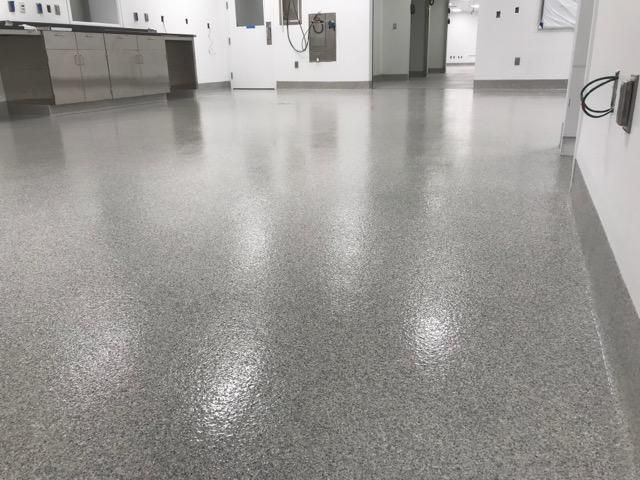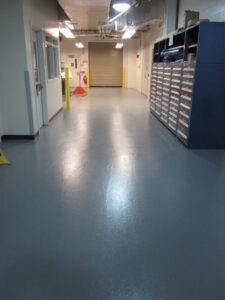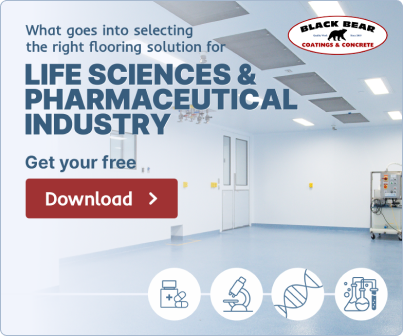
There are numerous factors to consider when laying down pharmaceutical flooring in a production facility, or any other operation that involves working with chemicals. In these cases, the floor should be engineered for heavy duty use. Not only does it need to stand up to the rigors of daily business, while passing all relevant health and safety regulations, it also needs to be able to withstand spills from caustic materials.
With most floor solutions, this would be a nearly insurmountable challenge. Industrial chemicals can eat right through most floors. However, there is one exception: resin-coated floors. Chemical-resistant resinous coatings offer all the protections that pharmaceutical manufacturers need for safety standards and sterile operation, while remaining cost-effective to implement.
Why Resinous Chemical Resistant Floors Are A Must When Working With Caustic Chemicals
Even a basic resinous floor is one of the hardest and overall toughest materials you could use for flooring in a commercial or industrial environment. Resins such as epoxies create an incredibly strong durable layer which can resist even heavy machinery, along with standing up to unlimited foot traffic. They are quite difficult to damage and can provide years of service with very little maintenance.
Where resins really excel, is in their ability to be formulated to meet the needs of individual environments. They can be made harder, to resist crushing forces and hold up heavy machines, or they can be made slightly resilient to resist dropped objects or piercing damage.
Further, the formula can also be tweaked to add resistance to virtually any chemical, including strong acids, bases, or other solvents which could eat straight through most flooring materials. If necessary, the amount of coating can even be increased to maintain the integrity of the system. There are also options for adding anti-microbial properties, so that the floor is outright hostile to any contaminants which must be kept away from your products (more on that below). In combination with low or no VOCs installation, you can prevent any airborne chemical contamination.
As the floor is a single continuous flat surface, spills won’t seep into the surface or spread to adjacent areas. They can be quickly removed through appropriate means. Damage to the floor will be kept at a minimum, and productivity won’t be affected.
Resinous Flooring Solutions Meet The FDA’s Current Good Manufacturing Practices (GMP flooring) For Pharmaceutical Companies
For over a century, America has recognized that the manufacturing of pharmaceutical products must be strictly controlled and overseen, to prevent the creation of tainted medicine. Since it’s usually impossible for consumers to detect or recognize tainted medicine, responsibility for manufacturing oversight falls to the Food & Drug Administration (FDA). In turn, the FDA has established a number of Current Good Manufacturing Practices (CGMPs) which create a minimum threshold all pharmaceutical handling facilities are expected to meet or exceed. Failure to adhere to these standards can result in significant fines, or even a complete facility shutdown!
It is absolutely critical that each aspect of a pharma manufacturing facility operations meet these CGMPs – including the flooring solutions. A proper floor will go a long way towards making CHMP compliance achievable, while poor flooring may make compliance impossible.
Types of Flooring Allowed in Pharmaceutical Manufacturing
As outlined by the FDA, major CGMPs relating to flooring include:
• A generally aseptic manufacturing environment
• Floors must consist of hard smooth surfaces
• Floors must be easily cleanable
• Allowing the flow of materials while preventing contamination
• Clean rooms must maintain extremely low particle counts

Resin-coated concrete is the one class of floor generally recognized for its ideal performance that meets CGMPs for pharmaceutical manufacturing.
A solid concrete substrate topped with a resinous material such as epoxy, polyurethane, or MMA meets all these requirements easily. The surface which results is extremely hard and durable, capable of holding up under heavy use – even use of large vehicles such as forklifts and cherry pickers.
Likewise, the surface is perfectly smooth, stretching from edge to edge across any room. This makes it exceptionally easy to clean. So, the floor gives no opportunity for dangerous microbes to take root, and all particulate matter can be easily removed from the floor with standard cleaning processes. These floors are suitable for even clean room work. With proper cleaning procedures, they can be kept entirely aseptic and free of contaminating debris.
In addition, resin-coated floors are resistant to most chemicals, including relatively caustic liquids (as mentioned above). Should a facility work with particularly exotic or dangerous materials, there are usually options for custom resin mixes with extra resistance to those chemicals. So, there’s very little chance of spills or other accidents compromising the floor and its aseptic properties.
Mitigating Risk of Infectious Disease with Commercial Flooring
Since the beginning of the coronavirus outbreak in 2020, we’ve all become hyper-aware of the potential for infection in our day-to-day lives. Business owners in all industries are now looking into ways to reduce the chances of disease spread on their property. Whether looking to protect their own workers, or visitors and customers, it’s great that they want to improve safety within their facilities.
We often get asked about whether commercial floors can have an impact on disease transmission – and the answer is an unqualified yes. Your flooring can have a big impact on whether people are safe from disease, and understanding how can help you select the best flooring options for your business.
How Flooring Can Encourage OR Inhibit The Spread Of Disease
As mentioned, the big way that many flooring types encourage disease spread is by giving microbes places to hide. As an example, take tile floors with grout between the tiles. Grout is inherently porous, and all the tiny holes make for perfect ‘homes’ that viruses, bacteria, and other microorganisms can breed in. Further, because the holes in grout are so small, it’s extremely difficult to clean and sterilize effectively.
Other floor types tend to easily develop cracks, warping, or other defects which create these sorts of dark cervices. If the floor gives microbes a chance to breed and spread, it’s going to be an ongoing source of potential infections.
So, what do companies such as pharmaceutical manufacturing plants do when they need a floor which will resist diseases? They choose resin-coated concrete.
Resinous concrete coatings create a completely even, seamless flooring solution which means it’s far harder for microbial life to hide away. Regular cleanings and more thorough sterilizations are also easier to accomplish.
Resins used in these coatings can be custom-mixed to accomplish goals. Anti-microbial agents can be added to the mix, to further reduce the chances of disease spread in flooring systems. When the floor itself is hostile to microbial life, that makes it almost impossible for viruses or bacteria to spread.
Black Bear Coatings & Concrete
As the number one partner in resinous coatings, Black Bear offers solutions for the life sciences industry and pharmaceutical manufacturing companies. We engineer floors using epoxy, urethane, polished concrete and methyl methacrylate (MMA) products. These systems provide the technology to tolerate organic substances and biological matter found in pharmaceutical production plants. In addition, Black Bear’s chemical resistant floors comes in an array of colors and design options that enhance the aesthetics of a working environment, and complement the look and feel of a building’s décor.
Our experts value engineer the right solution for your pharmaceutical and biotech flooring needs. We experience providing chemical resistant solutions for pharmaceutical manufacturing companies. Black Bear is a leading concrete and coatings flooring company that serves New England – Maine, Massachusetts, New Hampshire, Northern Connecticut, Rhode Island, Vermont, as well as New York (north of New York City). Rest assured that we have the staff, equipment, and expertise needed to make your floor project a success.



